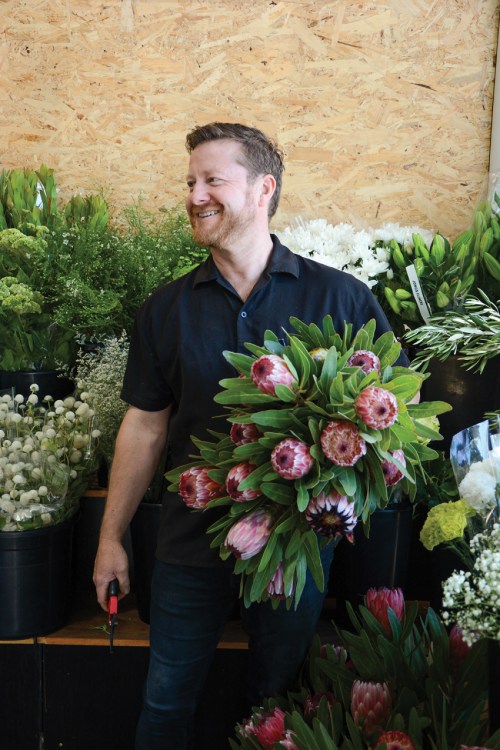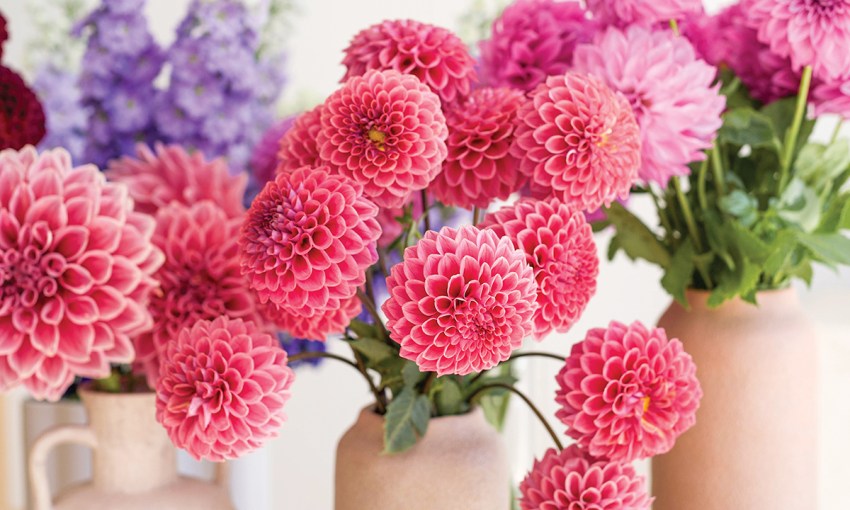Take a tour around South Australian flower farms to discover the labour of love that goes into every single bouquet.
Meet SA’s flower growers
Little Lyndoch Flower Farm
From the very beginning, Katie Arena and Rob Ryan had a clear vision for a dahlia farm they wanted to create. But when they looked out at their newly-purchased property at Lyndoch more than five years ago, the realisation hit that the fruition of that vision wasn’t going to come easily.
“It was a run-down, two-acre block when we purchased it, with overgrown grass, a livestock shed, a gutted farmhouse with no hot water and an outdoor toilet down the back of the property,” Katie says. “It’s been a wild ride over the past few years. We have made a lot of sacrifices and invested all of our time and money into our dream.”
Seven years ago, Katie left her nine-to-five job to chase her dream of running a floral design business and is now a self-taught florist.
She started her floral design studio, The Queen’s Quarters, and the idea for her farm came about when Katie wanted to offer wedding clients fresh flowers directly from the land.

Today, the Lyndoch Flower Farm flourishes with colour when their 3000 beautiful dahlia plants are in season; the vision finally realised.
“We also fell in love with the country lifestyle and being able to be more sustainable with our practices,” Katie says.
While Katie had her hands full of beautiful blooms, Rob stepped in to fill the role of the farmer. This too, has come about through on-the-job learning: when the couple first walked onto the property, Rob, a personal trainer, had never picked up a power tool.
“Neither of us are from the area or knew anything about farming,” Katie says. “We taught ourselves along the way with a lot of trial and error.
“We both believe in the power of self-belief and when you back yourself you can learn new things and can achieve anything.”
Their first attempt at growing dahlias began with a modest six plants, which quickly turned into 600, and now they grow 3000 plants each year, adding in some gorgeous ranunculus, spread across nearly an acre of their land. Days begin early at 5.30am with tending to their little horde of pets and then harvesting at 6am, when the rest of the team of six arrive to help with the harvest and wrap bunches for the market stall.

Katie has a design studio on the farm – a place to create arrangements for weddings and special occasions.
Now that the farm is well-established, the couple has finally been able to dedicate time to the brand new modern farmhouse they’re building. “I’ve been cooking on a barbecue for five years, so bring on a kitchen!”
Now that everything is running smoothly, Katie has opened the farm up to the public, running Bloom workshops – a floral design business retreat.
“I wanted to create an experience that I wish I could have attended when I was first starting out in business, or when I was in those first few crucial years in business when you start facing new challenges and feel alone.”
The three-day retreat begins with business and social media on day one, and quickly turns to flowers, creative time, food and wine for the rest of the time.
“We are in another growth phase this year so it’s been a little hectic at times running the floral design studio and flower farm, but I truly believe flowers have the ability to bring a little bit of magic into people’s lives and teach us so many things.
“We get to brighten up people’s days with our flowers and we are able to share a small part of our farm with others through our dahlia tubers and flower seeds. “I love our team and feel grateful to share this experience with an incredible group of people. We’re building something special together!”
The farm is such a special place for the pair, who have built their house to face the sun setting over the dahlia field each evening.
“Our farm is our happy place and we see how our little part of the world makes others feel when they visit, so we look forward to continuing working and sharing our farm as much as we can.”
Wildhand Farm
A chance spotting of a plant on Alice and Rhys’s Willunga Hill property has put them on a new and unexpected path.
The couple bought the Fleurieu Peninsula property in 2020, a month before Covid hit, with visions to create a new life for themselves on the land – they just weren’t sure what that meant yet.
While Alice grew up in Perth, Rhys’s father ran a sheep farm in Mount Compass for about 40 years, so he had some experience working on the land.

“We stumbled upon this property at Willunga Hill and loved the idea of farming,” Alice says. “We thought through some ideas, but really had no idea how we could make it work.”
Then luck struck when a flower grower pointed out a huge protea shrub on the property.
“The shrub was already established, in the peak of its bloom, so it had a couple of hundred heads on it, all flowering. It was stunning.”
The grower bought the flowers from Alice and Rhys and it got them thinking about planting more.
“We did more research and soil tests and realised the farm, especially the hill we’ve planted on, is perfect for growing proteas and natives.”
In that first year, they planted 600 trees, which take about five years to establish. Now, a few years on from that, there are more than 4500 plants across their 25 acres.
Because it was going to be slow going for the first few years, Alice and Rhys came up with a shorter-term contingency plan, buying highland cows and selling the calves, and planting some smaller native shrubs that flower more quickly.
This coming winter will be the first big harvest for Wildhand Farm, with all the proteas and foliage ready to go.
In the meantime, the 600 smaller shrubs, such as kangaroo paw, strawflower, and billy buttons, have been keeping the couple busy.
Also on the property are several eucalyptus varieties and some less common varieties, such as hakea and grevillea.
The couple bought an old grain silo and have converted it into a little farm shop at the front of the property, where they sell eggs, saltbush chocolate made with plants from the property and, of course, flowers.
If all of that isn’t enough, Rhys still holds his full-time job doing signage – they’re hoping he’ll be able to transition to the farm full-time this year – and the couple welcomed their daughter Nora into the world just over a year ago.
“I knew the farm would be good for Nora and I knew she’d enjoy it, but I never knew she would love being outside as much as she does. She’s happy just to play with the flowers and sticks while we’re outside.”
Wildhand Farm began with proteas (native to South Africa), but Alice and Rhys soon discovered Australian natives do even better in their soil, and there’s a growing market for them.
“The more natives we planted, the more wildlife we were seeing returning. When we bought the property, it was pretty bare, with not much to it. There wasn’t a lot of wildlife, but since we started planting, we’ve seen so many new bird varieties and a lot of new insects coming in.
“We’re always spotting koalas, turtles and ducks. It’s nice to see the wildlife appreciating what we’ve planted.”
Alice is a nutritionist and both she and Rhys are former personal trainers, so they’re health-conscious and careful about the chemicals they expose themselves to.
“We didn’t want to use chemicals, we’re trying to plant things in ways that counteract bad bugs,” Rhys says.
“When we started to research what it meant to use no chemicals, we found all this information about organic, regenerative farming, so we’ve gone in thinking about how we can apply that to what we’re doing. We’re working out what methods suit the flowers best – we’re still trialling everything at the moment.”
Alice says, for her, the transition to farm life was a struggle – a “complete shock” – to begin with.
“The work was so physical and you’re learning and doing at the same time, so it became overwhelming.”
But now, the struggle is in going back to the city. “I find that overwhelming now. I really like this slower-paced lifestyle and it’s gorgeous here – the people are so lovely, helpful and welcoming. Even if you’re working late at night and the sun’s going down and you’re exhausted, you’re looking at the most beautiful sunset with birds flying over you and you can hear the insects. You’re staring at all these stunning flowers that we grow. I pinch myself every day.”
Flowers Everywhere
The seed was planted for Richard Harman when he was only 10 years old, after seeing a neighbour selling carnations. At that moment, he decided to plant and grow them himself.
A couple of years later, and then living on his father’s hobby farm at Two Wells, Richard began growing trees to sell to his neighbours.
“Out there, it was really barren because it went from broadacre farms to hobby farms,” he says.
Years later, Richard was selling agricultural products to farmers, but not very successfully.

“One day, I went into a rose farm to test their soil and on the way out, I saw there were all these ladies in a shed packing up roses. I asked for a price list and these were four dollars; I’d recently bought some for my girlfriend and they were $40.
“I was working on commission and going nowhere, so I thought I’d buy from a wholesaler and sell flowers.”
That night, Richard went home, made a flyer advertising a doubled wholesale price and dropped the flyers around the city.
“By the time I got home there were messages on my answering machine – this was the late ’90s – and people wanted flowers on Monday morning for their offices.”
As industrious as he was, Richard was a bit out of his depth and had to learn the names of all the different flowers and how to arrange them. By the time he’d canvassed the city several times, Richard had amassed about 40 weekly customers.
He continued all through study and turned down a job offer to dive right into flower-selling, buying his six-hectare Two Wells farm in 2009 and planting it out with natives and greenery, including king protea, gum, acacia, leucadendron and leucospermum. In conjunction with the farm, Richard runs florist shop, Flowers Everywhere, at Brooklyn Park and sells mostly local produce, including his own.
He’s also a tour guide at the Botanic Gardens of South Australia and teaches botany at TAFE SA.
The farm is almost ready for picking again after a rebuilding stage – every single plant was wiped out in the Sampson Flat bushfire in 2015.
“Literally everything I’d done was burnt. The only survivors were the bulbs. It took me a few years to get the motivation to start again, but slowly, I’m starting to get some bits and pieces into the shop again.”
This article first appeared in the May 2024 issue of SALIFE magazine.



